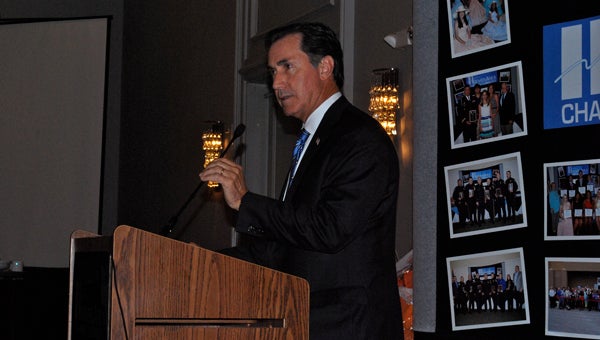Palmer talks fiscal issues at Hoover Chamber luncheon
Published 11:24 am Friday, October 16, 2015

Gary Palmer addresses the Hoover business men and women during an Oct. 15 Hoover Chamber of Commerce luncheon. (Reporter Photo / Molly Davidson)
By MOLLY DAVIDSON / Staff Writer
HOOVER—The United States budget and lowering the national debt were the two main issues U.S. Rep. Gary Palmer, R-Alabama, touched on during an Oct. 15 talk at the Hoover Chamber of Commerce luncheon.
“We’ve got some good folks in Washington, we’re working on some key things,” Palmer said. “We passed the first House budget that we’ve passed in six to eight years.”
Drawing on his experience on the Budget Committee, Palmer explained the nation’s fiscal problems are the “most critical.” The national debt currently sits at more than $18 trillion, but Palmer said the $3 trillion budget hopefully will set the country on the path to getting “our fiscal car out of the ditch.”
“We’re sending ourselves on a path to get our fiscal house in order,” Palmer said.
In addition to the budget, Palmer said simplifying and cutting regulations could pump more money into the economy.
“Regulations cost our economy over $2 trillion last year… it’s something you’re paying, it’s real money,” Palmer said. “It’s having an incredibly negative impact on our economy.”
Along with costing the economy money, Palmer said the complexity of regulations is the number one deterrent to entrepreneurs and those considering expanding their businesses.
“We have millions of pages of regulations,” Palmer said. “You cannot hire enough lawyers to run a business legally. Even the regulators disagree what the regulations are.”
Similarly, Palmer spoke of simplifying the United States tax code and working to ensure all money that is owed to the government is collected.
“The federal government collects 84 percent of what (taxes) it’s owed,” Palmer said, noting that leaves $570 billion uncollected. “That covers the deficit.”
Palmer also noted the potential revenues in the export of energy from the United States. The House of Representatives recently approved legislation that would end the 40-year ban on exporting crude oil, Palmer said.
“The United States is literally an energy superpower, but we don’t take advantage of it,” Palmer said. “(Exporting crude oil) would generate $29 billion in new government revenues in the next year.”









